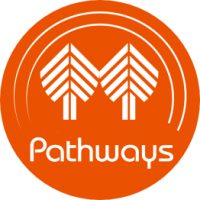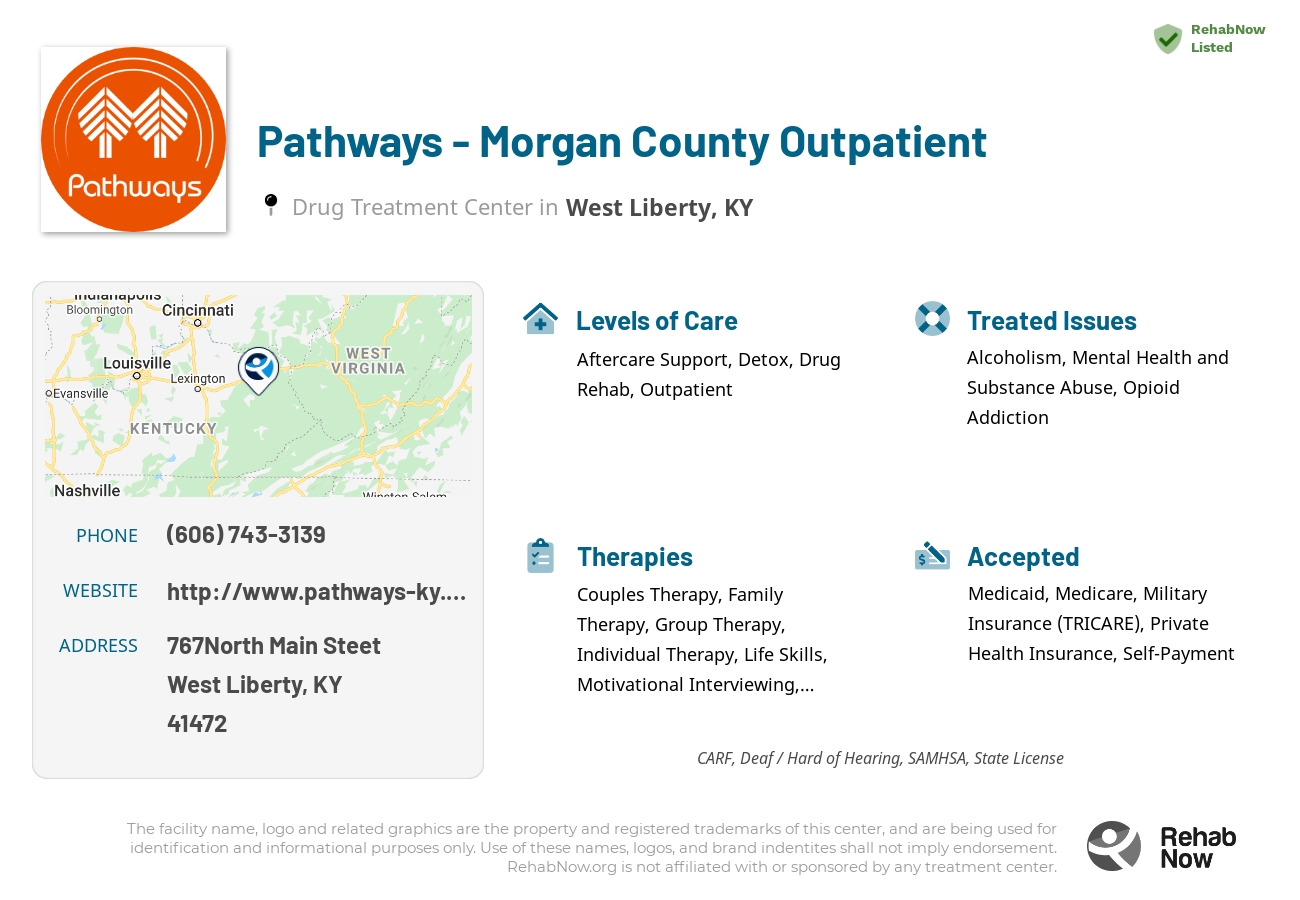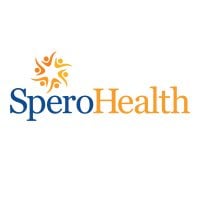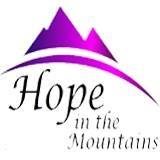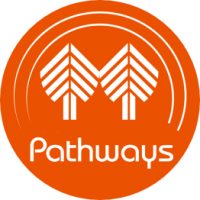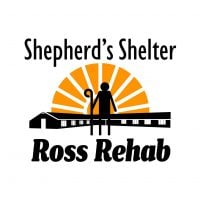Pathways - Morgan County Outpatient
Drug Rehab Center in West Liberty, Kentucky
Pathways - Morgan County Outpatient is an accredited treatment facility in West Liberty, Kentucky that provides evidence-based, personalized care for addiction, substance abuse, and mental health needs, utilizing innovative and supportive programs, including cognitive behavioral therapy, motivational interviewing, trauma-informed care, and medication-assisted therapy.
About This Kentucky Facility
Pathways - Morgan County Outpatient is an addiction treatment facility located in West Liberty, Kentucky. Established in 1966, this facility specializes in helping individuals struggling with alcoholism, opioid addiction, dual diagnosis, and drug addiction. Pathways - Morgan County Outpatient offers a range of services to meet the unique needs of each individual, including aftercare support, detoxification, drug rehabilitation, and outpatient levels of care. With its CARF, SAMHSA, and State License accreditations, Pathways - Morgan County Outpatient demonstrates its commitment to providing high-quality, evidence-based treatment to its patients. In addition, they accept private health insurance, making their services accessible to a wider range of individuals. Pathways - Morgan County Outpatient is affiliated with Pathways - Kentucky, a leading organization in addiction treatment and recovery.
At Pathways - Morgan County Outpatient, individuals struggling with addiction and substance abuse can find comprehensive and specialized care. The facility offers a range of services tailored to meet each person's unique needs. This includes aftercare support, which helps individuals transition back into their daily lives and maintain sobriety beyond their initial treatment. Additionally, Pathways - Morgan County Outpatient provides detoxification services to help individuals safely and comfortably withdraw from substances. The facility also offers drug rehabilitation programs that include counseling, therapy, and other evidence-based treatment modalities to address the underlying causes of addiction. With its outpatient levels of care, individuals can receive treatment while still being able to live at home and manage their daily responsibilities. Overall, Pathways - Morgan County Outpatient is dedicated to helping individuals overcome addiction and achieve lasting recovery.
Genders
Ages
Modality
Additional
Accreditations
State License
SAMHSA

CARF
The Commission on Accreditation of Rehabilitation Facilities (CARF) is a non-profit organization that specifically accredits rehab organizations. Founded in 1966, CARF's, mission is to help service providers like rehab facilities maintain high standards of care.
Conditions and Issues Treated
Opioid addiction treatment should be done in a medically supervised drug rehab. Opioid addiction treatment will include detoxification and drug rehab counseling to help both the user and their loved ones learn how to live a successful sober lifestyle. Methadone, buprenorphine, and naltrexone are three medications that can help treat opioid addiction. Individual drug rehab counseling sessions can be helpful to discuss any questions or concerns with the drug treatment program.
Levels of Care Offered at Pathways - Morgan County Outpatient
This center offers a variety of custom treatment tailored to individual recovery. Currently available are Aftercare Support, Detox, Drug Rehab, Outpatient, with additional therapies available as listed below.
Detoxification is the first step in drug addiction treatment. A controlled environment where symptoms can be managed with medication and close observation is provided by drug detoxification. Detoxification is an essential step in the recovery process, but it is also one of the most dangerous. Due to the potential danger, it’s critical to understand what detoxification is and how to complete it safely.
A detox program helps the person physically withdraw from drugs and helps them track their progress. So, suppose the person isn’t ready for sobriety (or relapses). In that case, the treatment professionals can catch it early and help re-orient them towards recovery.
Individuals struggling with drug addictions can get help from several treatment options, including inpatient and outpatient programs. Outpatient drug treatment programs can also provide patients with different levels of care, usually depending on the patient’s degree of addiction.
At an outpatient program in West Liberty, a patient will attend a recovery program during the day and return home in the evening. Suppose a patient is struggling with drug addiction. In that case, an outpatient program can serve as an effective transition point during the recovery process.
Aftercare is a part of drug rehabilitation. It is also known as “post-treatment support.” Aftercare programs are available for addicts after they complete drug rehab. It is often the final step in the recovery process. The goal of aftercare is to ensure that addicts maintain their achievements in rehab and do not relapse. Professionals generally provide aftercare (including addiction therapists, physicians, social workers, psychologists) and involve individual and group therapy sessions.
Therapies & Programs
Individual therapy is a critical component of addiction recovery. It allows the patients to go deep into their core issues and discover how to handle those problems better. Therapy can be conducted in individual sessions as well as group settings. In individual therapy for addiction, the patient meets with their therapist one-on-one to focus on the underlying issues. This allows patients to open up and discuss personal topics they may not feel comfortable discussing in a group setting. This type of therapy can help develop solutions specific to each patient, which helps speed up the recovery process.
Couples therapy is beneficial for couples in which at least one partner has a substance use disorder. This type of therapy can help partners improve communication skills, which is an important factor in a healthy relationship. It can also help partners better understand one another so they have a greater understanding of how the other partner may be feeling.
Benefits of couples therapy include:
- Improvement in communication skills
- Increased understanding of the dynamics within a relationship
- Increased sense of support and trust in the relationship
- Better teamwork between partners/increased willingness to listen and work together
- Enhanced tolerance of each other’s shortcomings
- Improved ability to have open, honest communication with each other
Family therapy is a crucial part of drug treatment and getting sober. It is one of the most effective ways to help addicts stay on the path to long-term sobriety. When a drug addict decides that they want to try and get sober, it takes the support of every person they love to succeed. It can be incredibly difficult for loved ones to watch an addict go through the pain and suffering of withdrawal, but by being there with them and supporting them, they can help to make sure that the addiction never returns.
One of the most important parts of family therapy is the relapse prevention plan. During treatment, therapists and doctors will often sit down with the addict and their family to develop a plan in case the addict ever feels like they want to use again. This plan should involve steps the addict and family can take together to prevent them from relapsing in the future. An addict’s family can play a vital part in helping them to avoid relapse because they can spot the warning signs and help them get back on track before it becomes too much of a problem.
Group therapy helps prevent addicts from feeling isolated or unique in their situation by offering a sense of comfort and fellowship. It also creates a forum for addicts to build their support systems and learn from each other. The group therapy sessions at Pathways - Morgan County Outpatient occur in a group setting rather than one-on-one to create a safer, controlled environment where addicts feel comfortable.
Trauma therapy helps people dealing with addiction by allowing them to confront the traumas of their past and move past them. It is important to note that trauma therapy should not be confused with PTSD (post-traumatic stress disorder) Rather, it is used to treat the effects of trauma, which are often at the root of addiction.
Cognitive Behavioral Therapy (CBT) is a common therapeutic approach to help drug addicts. It teaches addicts new ways of thinking and behaving so that they can avoid relapse. There are several forms of CBT used in drug rehabilitation centers.
Cognitive Restructuring helps addicts identify faulty, negative thinking so that they can work together with the therapist to find healthier ways of thinking, resulting in better decision-making.
Cognitive Behavioral Therapy for Addiction uses the principles of CBT to help treat addiction. It focuses on specific aspects of each person’s thinking, feeling, physiology, and behavior. It aims to identify specific problems in these areas and create a personalized treatment strategy.
Rational Emotional Behavior Therapy aims to help you understand your emotions and how they affect your behaviors and addiction. It breaks down the addiction and behaviors behind it. Those who complete the program will identify their feelings and reactions and positively change their behaviors.
The best drug treatment centers offer various services to help addicts learn how to live without drugs. Since addiction is a chronic physical and mental illness, addicts need to learn as many life skills as possible to help them stay clean and sober.
Many drug treatment centers like Pathways - Morgan County Outpatient offer life skills activities as part of their addiction recovery programs. Examples include cooking classes, employment training, resume writing seminars, parenting classes, and computer training. When addicts have various life skills to lean on, they’re better equipped to put their addiction behind them for good.
The primary goal of life skills activities at drug treatment centers like Pathways - Morgan County Outpatient is to help addicts recover from addiction and learn how to live a useful, productive life. Life skills activities help addicts find employment, take care of their families, and give back to the community. After learning about these various life skills, addicts are better prepared to return to society and lead happy healthy lives.
Payment Options Accepted
For specific insurance or payment methods please contact us.
Is your insurance accepted?
Ask an expert, call (888) 674-0062
Pathways – Kentucky Associated Centers
Discover treatment facilities under the same provider.
- Pathways - Greenup in Greenup, KY
- Pathways - Montgomery County Outpatient in Mount Sterling, KY
- Pathways - Rowan County Outpatient in Morehead, KY
- Pathways - Grayson in Grayson, KY
- Pathways - 22nd Street IOP in Ashland, KY
Learn More About Pathways – Kentucky Centers
Additional Details
Specifics, location, and helpful extra information.
West Liberty, Kentucky 41472 Phone Number(606) 743-3139 Meta DetailsUpdated November 25, 2023
Staff Verified
Patient Reviews
There are no reviews yet. Be the first one to write one.
West Liberty, Kentucky Addiction Information
Kentucky ranks among the top ten states for opioid-related overdoses. Most of these are due to heroin, fentanyl, and prescription opioid use. A little over 11% of the Kentucky population abuses alcohol in a given year. More than 15% of Kentucky adults admit to participating in binge drinking every month.
Treatment in Nearby Cities
- Lancaster, KY (75.1 mi.)
- Stanton, KY (33.2 mi.)
- Bellevue, KY (105.1 mi.)
- Owensboro, KY (210.6 mi.)
- Lawrenceburg, KY (89.6 mi.)
Centers near Pathways - Morgan County Outpatient
The facility name, logo and brand are the property and registered trademarks of Pathways - Morgan County Outpatient, and are being used for identification and informational purposes only. Use of these names, logos and brands shall not imply endorsement. RehabNow.org is not affiliated with or sponsored by Pathways - Morgan County Outpatient.
